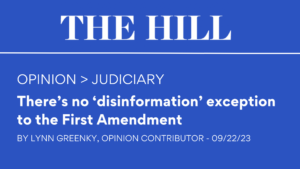There’s no ‘disinformation’ exception to the First Amendment | The Hill

Misinformation and disinformation retain the basic characteristics of speech. Unless they fall into one of very few exceptions, they are protected from censorship under the First Amendment.
Consistent with those very limited exceptions, any effort by the government to prevent the dissemination of ideas or opinions, even if they are based on untruths, is unconstitutional.
A three-judge panel for the Fifth Circuit Court of Appeals recently upheld an injunction that prohibits the government from pressuring social media platforms to de-escalate or remove speech that the government identifies as misinformation or disinformation.
On Thursday, Sept. 14, that injunction was put on pause by the Supreme Court until Sept. 22, to give the Court more time to consider the issue.
The injunction resulted from a lawsuit filed by the attorneys general of Missouri and Louisiana and others accusing the federal government of strong-arming social media companies in order to amplify government-approved points of view and muffle or silence opposing views.
The federal government’s argument was that it did no more than partner with the companies and assist them in rooting out disinformation. Dismissing this argument, the Fifth Circuit held that the government implemented a coordinated campaign of such unrelenting pressure that the content moderation policies implemented by the platforms were no longer independent. Instead, the platforms were functioning as agents of the government, transforming the content moderation decisions into state action.
In other words, the appellate panel found that the social media platforms essentially acted as agents of the federal government when the platforms removed or de-amplified posts based on government-created criteria of truth or falsity. In doing so, the court found that the government unconstitutionally censored the speakers’ and listeners’ First Amendment rights.
The White House, the CDC, the FBI and the surgeon general, the court held, may not threaten the platforms with regulatory…Read More
Lynn Greenky is a Professor Emeritus at Syracuse University, where she taught a beloved undergraduate course about the First Amendment for 10 years. She continues to write and speak about the First Amendment and is the author of When Freedom Speaks.